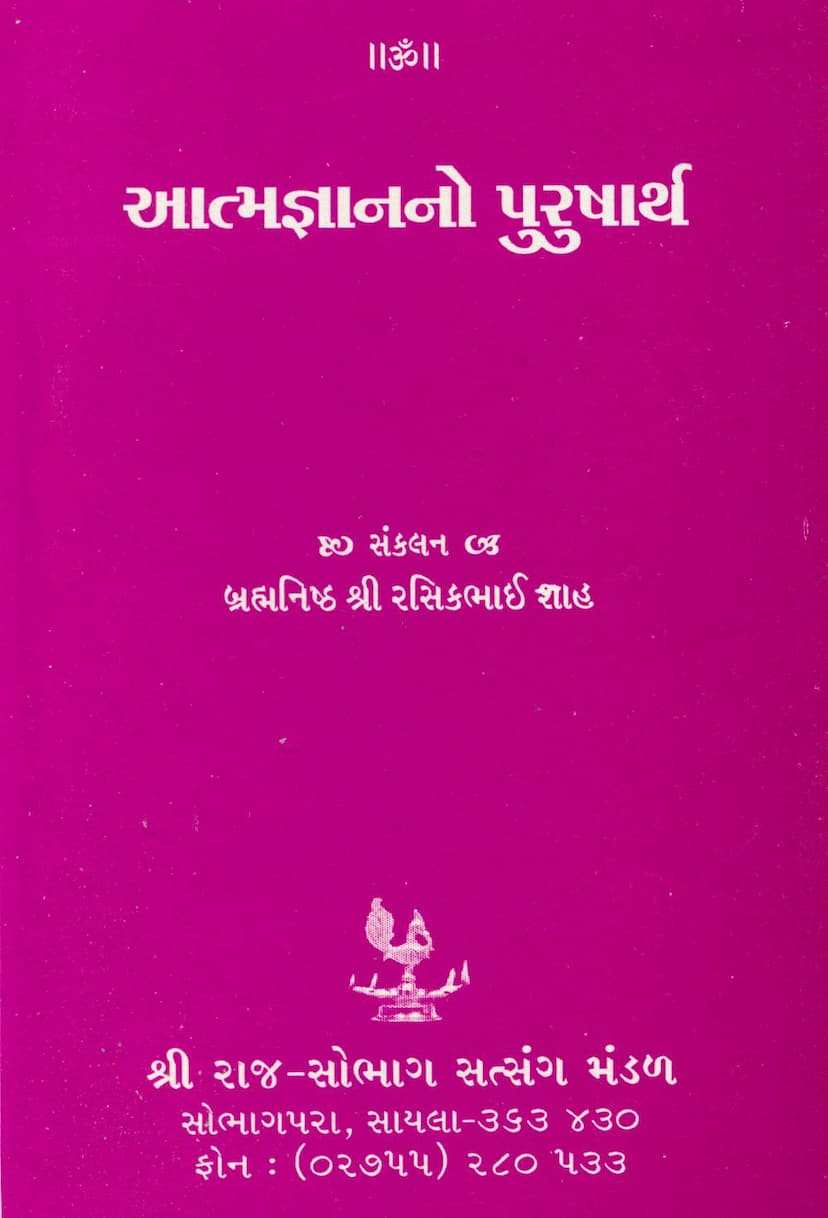Aatmgnanno Purusharth
Added to library: September 1, 2025

Summary
This Jain text, titled "Aatmgnanno Purusharth" (The Endeavor for Self-Knowledge), compiled by Rasik Shah and published by Shri Raj-Saubhag Satsang Mandal Saila, is a spiritual guide focused on achieving self-realization and liberation through diligent spiritual practice. It's a compilation of thoughts and guidance derived from discussions with seekers and answers given by experienced souls.
The core message emphasizes the importance of Bhedgnan (Discrimination between the self and the non-self) as the primary path towards spiritual progress. The text presents a series of 90 points, each offering profound insights and practical advice for the spiritual aspirant.
Here's a comprehensive summary of the key themes and teachings:
I. The Nature of the True Self:
- The Self is Pure, Self-Sufficient, and Blissful: The true self is described as pure, self-illuminating, eternally blissful, independent, and complete. It is the knower (Gnayak), unaffected by anything external.
- Discrimination is Key: The fundamental principle is to discriminate between the true self (Atma) and the non-self (body, senses, external objects, even emotions and thoughts). This discrimination is the essence of self-knowledge.
- The Self is Not the Body or Its Functions: The text repeatedly stresses that the self is not the body, its experiences, its actions, or its states of being. It's the pure consciousness that witnesses all these.
- The Self is Beyond Attachment and Aversion: True happiness and peace come from realizing the self's inherent detachment from external phenomena and internal emotional fluctuations.
II. The Path to Self-Realization (Purusharth):
- Constant Self-Awareness: The endeavor for self-knowledge requires continuous introspection and remembrance of one's true nature.
- Renunciation of External Attachments: Any attachment to external objects, relationships, or worldly possessions is considered a hindrance to spiritual progress. Even internal attachments to worldly thoughts and opinions must be relinquished.
- Focus on the Inner Self: The path lies within. External actions, while sometimes necessary, are secondary to cultivating inner awareness and stability.
- Self-Reliance: True spiritual progress is an individual effort. Relying solely on external support or guidance is not sufficient. The strength and knowledge for liberation are within.
- Overcoming Delusions and False Beliefs: The text highlights the need to shed false beliefs and misconceptions that lead to suffering. This includes overcoming the ego, desires, and attachments.
- Importance of Right Knowledge and Faith: Understanding the true nature of the soul through right knowledge (Samyak Gnana) and unwavering faith (Samyak Darshan) is paramount.
- Practice of Equanimity (Samata): Cultivating equanimity in the face of dualities like pleasure and pain, gain and loss, is essential for spiritual stability.
- Vairagya (Detachment) as the Foundation: Detachment from worldly desires and experiences is the bedrock upon which self-knowledge is built.
- The Power of Vivek (Discrimination): The ability to discriminate between the real and the unreal, the eternal and the transient, is crucial for spiritual advancement.
- Living in the Present Moment: Dwelling on the past or worrying about the future distracts from the present reality of the self.
- Self-Discipline and Right Conduct: Adhering to ethical principles, controlling senses, and cultivating virtues are integral to the spiritual journey.
- The Role of the Guru and Scriptures: While self-reliance is emphasized, the guidance of a true spiritual teacher (Sadguru) and the study of sacred scriptures (Shatras) are presented as valuable aids for understanding and navigating the path. However, ultimately, one must rely on their own inner realization.
- Overcoming the Illusion of "I" and "Mine": The deepest attachments stem from the identification with the body, possessions, and personal experiences. This illusion must be shattered.
- The Importance of Persistent Effort: The path to self-realization is not easy and requires continuous, unwavering effort and perseverance, even in the face of challenges.
III. Specific Practices and Attitudes:
- Meditation and Contemplation: Regular meditation and contemplation on the true nature of the self are recommended.
- Study of Scriptures (Swadhyaya): Understanding the essence of the scriptures is vital for gaining the right perspective.
- Discernment of Causality: Understanding the cause-and-effect relationship of actions and their consequences is important.
- Non-attachment to Outcomes: While effort is necessary, being attached to specific results can create further delusion.
- Equanimity in All Circumstances: The aspirant should strive to remain calm and centered, regardless of external situations or internal emotional states.
- Renunciation of Virtues for the Sake of the Self: The text suggests that even seemingly virtuous worldly actions, if performed with attachment, can become hindrances. The ultimate goal is to focus solely on the self.
- Self-Inquiry: Constantly questioning "Who am I?" and seeking the answer from within is a core practice.
- Living a Life of Simplicity and Contentment: Avoiding extravagance and finding satisfaction in what one has is crucial.
IV. Overcoming Obstacles:
- The Obstacles of Desire and Attachment: Greed, lust, anger, pride, and other passions are the primary obstacles on the spiritual path.
- The Illusion of External Happiness: True happiness does not come from external sources but from within.
- The Danger of False Beliefs and Ego: Mistaking the non-self for the self and clinging to egoistic notions leads to suffering.
- The Importance of Overcoming Inertia and Laziness: Spiritual progress requires overcoming idleness and making consistent effort.
In essence, "Aatmgnanno Purusharth" is a profound manual for the dedicated spiritual seeker, offering a clear roadmap to liberation through self-discovery, discrimination, detachment, and unwavering devotion to the inner truth. It underscores that the ultimate freedom is attainable through one's own diligent efforts and direct experience of the pure, blissful, and eternal nature of the soul.